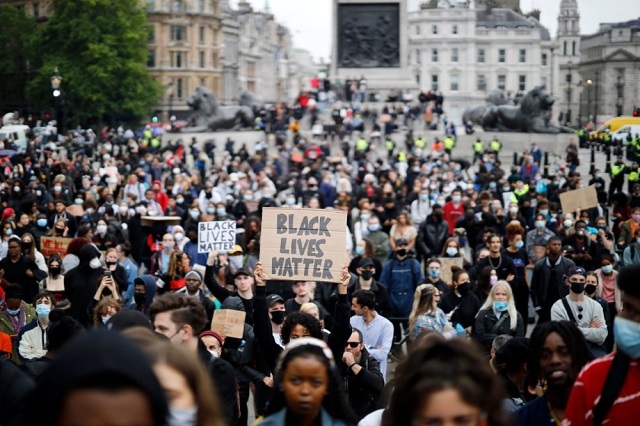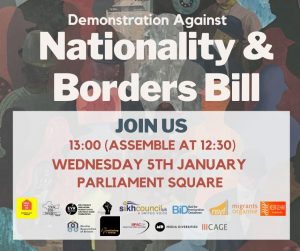For the Culture: Reflections on Black & Brown Activism Comment
New in Ceasefire - Posted on Sunday, January 2, 2022 12:53 - 0 Comments

Activists hold placards at a Black Lives Matter protest in Trafalgar Square in London, June 12, 2020. (credits: Tolga Akmen/AFP via Getty Images)
After a two-and-half-year break from the online world, I came back at the start of December. It was because of the Nationality and Borders Bill. I felt I had a duty to.
In 2018, after another year spent offline due to the daily stresses of running and being the founder of Media Diversified, I wrote an article about my year working in construction, in which I described how being online felt like towards the end: “I was going to bed dreaming of endless Twitter fights with columnists and random trolls. And I realised: it was all driving me crazy”.
As any black and brown activist knows, activism takes its toll on you: On your body, mind, relationships, health, work — the list goes on and on.
Because the causes we fight for aren’t ephemeral; they are most often about the worst miscarriages of justice, the most unimaginable crimes against humanity.
While I applaud the climate activism of people like George Monbiot, when you have campaigned about the sexual abuse of powerless children and women by people meant to protect them, everything else is gravy.
When author and psychologist Guilaine Kinouani and I embarked on the #PredatoryPeacekeepers campaign in 2016 we came at it from all angles, writing in the national media, in-person protests, twitter storms, TV interviews, posters, all of it.
One day I was among a large group of people protesting on UN peacekeeper Day. The next, I found myself on my own protesting outside the French embassy.
I called a fellow campaigner and organiser I’d known for over ten years. He told me this had happened to him too, numerous times: Alone and pissed off. He gave me a voucher for me to get a cab home and we chatted for a while. I am forever grateful to him because he made me laugh at a time when all I wanted to do was cry.
A week later, I was on BBC World News to talk about the campaign, as was UN Assistant Secretary-General Diane Corner, though she refused to be interviewed at the same time (i.e. to have a debate).
Thinking about this today, I do wish we had more resources. We should have kept going. We got so close.
This wasn’t the first time I felt this way. As long-time activists, we have seen a LOT: Starts, middles, and many premature ends to campaigns. Misconstrued people, infiltrators, abusers and rapists and more.
Talking last week to a friend and fellow activist (or, as Priti Patel defines it, partner in crime) we got to the topic of why people go into activism.
“I guess you do it for the culture! Doesn’t pay the bills tho I guess…I’m lucky I’ve got a secure job so I don’t need to find funding to do activism in my spare time,” he told me.
“The culture?” I replied, “I’m not sure that’s quite right. I do it because when I stop, people complain.”
“Yeah, that’s what I mean by “for the culture” 😂” He replied, “People complain when you’re not around because the culture loves you!”
Reflecting this week on the success and achievements of our campaign, Guilane ended with this sobering assessment of the cost to those involved:
“… you have to mind your mental health… if the same bodies are always leading, organising, campaigning or doing justice work — irrespective of their own wishes/wants, they are being used. This is the same dynamic that occurs within institutions when the same ppl again & again do the work/carry the load for others. And this set up is not only unsustainable in the long term it 1) harms those who do the heavy lifting 2) sabotages social/structural change attempts 3) thus helps ensures the status-quo remains the status-quo. It’s why most campaigns eventually die down, activists get burnt out… And structures of power know…they just have to wait it out for that burn-out or fatigue to happen…usually it does before changes is required, although not always as we have seen…that is why we all have to do a little, everyday day. Change requires a collective effort…”
That last line of Guilane’s righteous engagement hit me in the heart. We need to be collective. We need to share the burden. We can’t do it alone.
Rappers, journalists, poets, — even bankers and lawyers — from whichever creative or professional field you come from: We cannot do it alone, and who would want to?
We must all work together because, on the other side of that coin, from abuse to torture to police murder, is us and our communities.
Through our collective work over the past years, black and brown activists have witnessed beauty, joy, solidarity and sometimes even success (if you want to know what that sounds like, listen to this recording from a recent protest outside Brixton Prison).
I would like to end with words from two of our greatest teachers.
“We don’t need any more writers as solitary heroes. We need a heroic writer’s movement: assertive, militant, pugnacious,’ wrote Toni Morrison.
For James Baldwin, “You write in order to change the world, knowing perfectly well that you probably can’t, but also knowing that literature is indispensable to the world…The world changes according to the way people see it, and if you alter, even but a millimetre the way people look at reality, then you can change it.”
Activism doesn’t need to be complicated or elaborate, it is as easy as making a video and posting it on YouTube or on social media.
This week, the Nationality and Borders bill is due to be debated in the House of Lords. A protest is to be held against it on the same day.
Let us honour those who came before us, who were fighting the fight against an even bigger machine than the one we face today. Let us honour those for whom slavery wasn’t ‘just’ a word or long-past atrocity, but a trauma the effects and legacy of which they suffered directly.
Let’s honour them and fight together. Let us Make Some Noise!
Let us do it for the culture.
On the Nationality and Borders Bill and the Hostile Environment, a final word of warning from Bobby Kasanga:
 Civil Demonstration Against the Nationality & Borders’ Bill
Civil Demonstration Against the Nationality & Borders’ Bill
The Muslim Association of Britian (MAB) alongside Media Diversified, South Asian solidarity group, The Association of Muslim Lawyers, Windrush lives Stand up to racism, – respond to the government’s racist and draconian Nationality and Borders Bill. Visit the FB event page for more info.
Weds 5th Jan – 1PM, at Parliament, London, UK
#NationalityAndBordersBill #StopNABB #RingtheAlarm



Leave a Reply